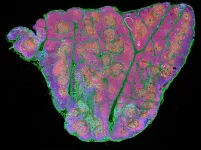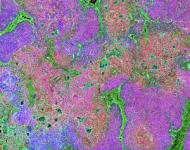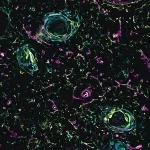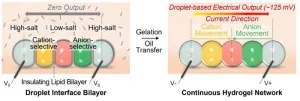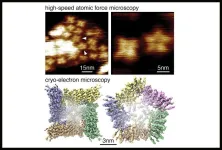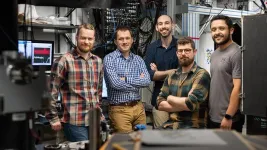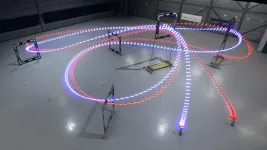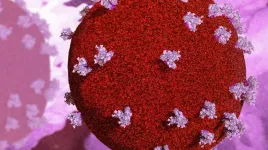Researchers identify stem cells in the thymus for the first time
2023-08-30
(Press-News.org) Francis Crick Institute press release
Under strict embargo: 16:00hrs BST 30 August 2023
Peer reviewed
Experimental study
Cells
Researchers identify stem cells in the thymus for the first time
Researchers at the Francis Crick Institute have identified stem cells in the human thymus for the first time. These cells represent a potential new target to understand immune diseases and cancer and how to boost the immune system.
The thymus is a gland located in the front part of the chest, the place where thymocytes (the cells in the thymus) mature into T cells, specialised immune cells crucial to fighting disease. The thymus has a unique and complex 3D structure, including an epithelium (a lining of cells able to guide T cell maturation) that forms a mesh throughout the whole organ and around the thymocytes.
As it is relatively inaccessible and shrinks with age – and because its function was discovered only a few decades ago – the thymus has only been investigated for a short period of time compared to other organs. Until now, scientists believed it didn’t contain ‘true’ epithelial stem cells, but only progenitors arising in fetal development.
However, these findings, published today in Developmental Cell, show for the first time the presence of self-renewing stem cells, which give rise to the thymic epithelial cells instructing thymocytes to become T cells. This suggests the thymus plays an important, regenerative role beyond childhood, which could be exploited to boost the immune system.
In the course of their experiments, the researchers examined these stem cells based on the expression of specific proteins in the human thymus. They identified stem-cell niches (areas where stem cells are clustered) in two locations in the thymus: underneath the organ capsule, or outer layer, and around blood vessels in the medulla, the central part.
They demonstrated that thymic stem cells contribute to the environment by producing proteins of the extracellular matrix, which functions as their own support system.
By using state-of-the-art techniques to map gene expression in single cells and tissue sections, they found that these stem cells, named Polykeratin cells, express a variety of genes allowing them to give rise to many cell types not previously considered to have a common origin. They can develop into epithelial as well as muscle and neuroendocrine cells, highlighting the importance of the thymus in hormonal regulation.
The researchers isolated Polykeratin stem cells in a dish and were able to show that thymus stem cells can be extensively expanded. They demonstrated that all the complex cells in the thymus epithelium could be produced from a single stem cell, highlighting a remarkable and yet untapped regenerative potential.
Roberta Ragazzini, postdoctoral research associate at the Crick and UCL, and first author, said: “It’s paradoxical that stem cells in the thymus – an organ which reduces in size as we get older – regenerate just as much as those in the skin – an organ which replaces itself every three weeks. The fact that the stem cells give rise to so many different cell types hints at more fundamental functions of the thymus into adulthood.”
It’s understood that the thymus’ activity is tightly regulated in adults, providing enough immune support to fight infections but not overshooting to the degree of attacking the body’s own cells.
However, in certain people, the thymus isn’t working properly, or their immune system has reduced capacity. Today’s findings suggest it could be helpful in these cases to stimulate the stem cells to regrow the thymus and rejuvenate their immune system.
Paola Bonfanti, senior group leader of the Epithelial Stem Cell Biology and Regenerative Medicine Laboratory at the Crick, said: “This research is a pivotal shift in our understanding of why we have a thymus capable of regeneration. There are so many important implications of stimulating the thymus to produce more T cells, like helping the immune system respond to vaccinations in the elderly or improving the immune response to cancer.”
The researchers will next study thymic stem cell properties throughout life and how to manipulate them for potential therapies.
-ENDS-
For further information, contact: press@crick.ac.uk or +44 (0)20 3796 5252
Notes to Editors
Reference: Ragazzini, R. et al. (2023). Defining the identity and the niches of epithelial stem cells with highly pleiotropic multilineage potency in the human thymus. Developmental Cell. 10.1016/j.devcel.2023.08.017.
The Francis Crick Institute is a biomedical discovery institute dedicated to understanding the fundamental biology underlying health and disease. Its work is helping to understand why disease develops and to translate discoveries into new ways to prevent, diagnose and treat illnesses such as cancer, heart disease, stroke, infections, and neurodegenerative diseases.
An independent organisation, its founding partners are the Medical Research Council (MRC), Cancer Research UK, Wellcome, UCL (University College London), Imperial College London and King’s College London.
The Crick was formed in 2015, and in 2016 it moved into a brand new state-of-the-art building in central London which brings together 1500 scientists and support staff working collaboratively across disciplines, making it the biggest biomedical research facility under a single roof in Europe.
http://crick.ac.uk/
END
ELSE PRESS RELEASES FROM THIS DATE:
2023-08-30
UNDER EMBARGO UNTIL 16:00 BST / 11:00 ET WEDNESDAY 30 AUGUST 2023
Researchers have developed a miniature battery that could be used to power tiny devices integrated into human tissues.
The design uses an ionic gradient across a chain of droplets – inspired by how electric eels generate electricity.
The device was able to regulate the biological activity of human neurons.
This could open the way to the development of tiny bio-integrated devices, with a range of applications in biology and medicine.
University of Oxford researchers have made a significant step towards realising miniature ...
2023-08-30
A member of an important class of ion channel proteins can transiently rearrange itself into a larger structure with dramatically altered properties, according to a study led by researchers at Weill Cornell Medicine. The discovery is a significant advance in cell biology, likely solves a long-standing mystery about an unusual feature of some ion channels and has implications for the development of drugs targeting these proteins and for drug delivery.
Ion channels are ubiquitous in the cell membranes of higher organisms. ...
2023-08-30
AURORA, Colo. (Aug. 30, 2023) – Scientists at the University of Colorado Anschutz Medical Campus have made a `paradigm shifting’ discovery on the mechanisms required for learning and memory that could lead to new therapies for Alzheimer’s disease and potentially Down syndrome.
The study was published Wednesday in the journal Nature.
For over 30 years, researchers believed that LTP or long-term potentiation, which is crucial for learning and memory, required enzymatic actions by an enzyme known as CaMKII.
But a team of researchers led by Ulli ...
2023-08-30
Modern medicine depends on antibiotics to treat infections by disabling targets inside bacterial cells. Once inside these cells, antibiotics bind to certain sites on specific enzyme targets to stop bacterial growth. Randomly occurring changes (mutations) in the genes for these targets occur naturally, in some cases making the target harder for the antibiotic to attach to, and that bacterial version resistant to treatment.
For this reason, the more antibiotics have been used over time, the greater the chances that bacterial populations will evolve to have mutants resistant to existing antibiotics, and the more urgent the call for new approaches ...
2023-08-30
Coastal wetlands and coral reef islands will struggle to grow fast enough to keep pace with rising sea levels driven by climate change, according to a new study published in Nature. The study was conducted by an international team that includes a Tulane University researcher. The findings show that the future of marshes and other low-lying coastal areas depend heavily on whether global warming can be limited to less than 2 degrees Celsius (3.6 degrees Fahrenheit) as formulated by the Paris Agreement.
A key finding of the paper is that coastal marshes, mangroves, ...
2023-08-30
Researchers have a new way to connect quantum devices over long distances, a necessary step toward allowing the technology to play a role in future communications systems.
While today’s classical data signals can get amplified across a city or an ocean, quantum signals cannot. They must be repeated in intervals — that is, stopped, copied and passed on by specialized machines called quantum repeaters. Many experts believe these quantum repeaters will play a key role in future communication networks, allowing enhanced security and enabling connections between remote quantum computers.
The Princeton study, published Aug. ...
2023-08-30
Cardiovascular disease remains the leading cause of racial disparities in mortality between Black and white people in the United States. New research from the University of Chicago Medicine suggests that parental incarceration may be contributing to these health gaps.
According to the new study, people who experienced a parent or parental figure’s incarceration anytime before the age of 18 had higher levels of hypertension and coronary disease biomarkers than people whose parents were not incarcerated. These results indicate that mass incarceration may have transgenerational health consequences.
Adverse childhood experiences (ACEs) are difficult ...
2023-08-30
A collaborative international research team led by Professor Yoo-Geun Ham from Chonnam National University and Professor Seung-Ki Min from Pohang University of Science and Technology (POSTECH) has made a discovery on the impact of global warming on global daily precipitation. Using a deep learning approach, they have unveiled a significant change in the characteristics of global daily precipitation for the first time. Their research findings were published on August 30 in the online version of Nature, the ...
2023-08-30
Remember when IBM’s Deep Blue won against Gary Kasparov at chess in 1996, or Google’s AlphaGo crushed the top champion Lee Sedol at Go, a much more complex game, in 2016? These competitions where machines prevailed over human champions are key milestones in the history of artificial intelligence. Now a group of researchers from the University of Zurich and Intel has set a new milestone with the first autonomous system capable of beating human champions at a physical sport: drone racing.
The AI system, called Swift, won multiple races against three world-class champions in first-person view (FPV) ...
2023-08-30
An existing blood cancer drug has shown promise in killing ‘silent’ HIV cells and delaying reinfections – a significant pre-clinical discovery that could lead to a future cure for the disease.
Hidden HIV cells, known as latent infection, are responsible for the virus permanently remaining in the body and cannot be treated by current therapy options. These hibernating, infected cells are the reason why people living with HIV require life-long treatment to suppress the virus.
Led by WEHI and The Peter Doherty Institute for Infection ...
LAST 30 PRESS RELEASES:
[Press-News.org] Researchers identify stem cells in the thymus for the first time
